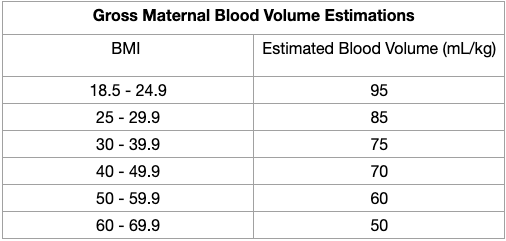Maternal blood volume estimator
A simple calculator to more accurately estimate maternal blood volume after 34 weeks gestation
Questions
About
Clinicians face the challenge of not only accurately measuring blood loss but also understanding its
clinical significance for each expectant mother. A crucial piece of information is knowing a patient's
peripartum circulating blood volume, as it enables us to interpret hemorrhage severity correctly and
provide appropriate resuscitation.
In cases of obesity, greater body weight can lead to an overestimation of blood volume, which, in turn,
may set overly high thresholds for blood product transfusions and cause treatment delays. The current
linear calculations employed to estimate circulating blood volumes based solely on patients' weights may
contribute to this issue. This is because blood volume doesn't increase proportionally to body
composition.
Of note, these calculations don't account for variations in circulating blood volume related to factors
such as maternal age, ethnicity, multiple pregnancies, pre-existing medical conditions, or fetal size.
Disclosure: The calculator is not recommended for a BMI > 50.

References
Kennedy H, Haynes SL, Shelton CL.
By using this site you acknowledge that you have read, understand, and agree to be bound by our terms of use and privacy policy. All content and tools are for educational use only, are not meant to be a substitute for professional advice and should not be used for medical diagnosis and/or medical treatment.